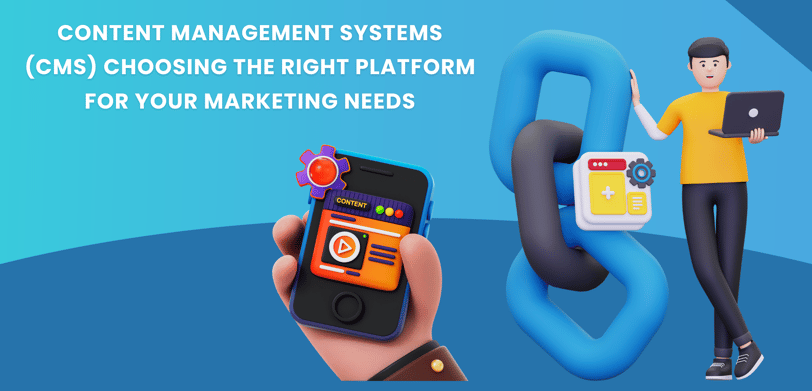
Content Management Systems (CMS) Choosing the Right Platform for Your Marketing Needs
Choosing the right Content Management System (CMS) is crucial for effective digital marketing. This guide explores key considerations such as ease of use, customization, SEO features, and security to help you select the best platform for your needs, ensuring streamlined content management and enhanced marketing performance.


In today's digital landscape, a robust and user-friendly Content Management System (CMS) is essential for effective marketing. A CMS simplifies the creation, management, and modification of digital content, empowering marketers to focus on strategy and creativity rather than technical details. With numerous CMS options available, choosing the right platform for your marketing needs can be daunting. This guide will help you navigate the selection process and find the best CMS to support your marketing goals.
Understanding Content Management Systems
A CMS is a software application that allows users to create, manage, and modify content on a website without needing specialized technical knowledge. It provides a user-friendly interface and various tools to facilitate content creation, editing, and publishing. Key features of a CMS include:
Content Editing: Intuitive editors (often WYSIWYG) for creating and formatting content.
Media Management: Tools for uploading, organizing, and managing media files like images and videos.
Templates and Themes: Pre-designed templates to ensure consistent design and layout.
Plugins and Extensions: Add-ons to enhance functionality and integrate with other tools.
User Management: Control over user roles and permissions for collaborative content management.
Key Considerations for Choosing a CMS
Ease of Use
User Interface: Look for a CMS with a clean, intuitive interface that makes it easy for non-technical users to create and manage content.
Learning Curve: Consider the amount of training required for your team to become proficient with the CMS.
Customization and Flexibility
Templates and Themes: Ensure the CMS offers customizable templates and themes to match your brand identity.
Plugins and Extensions: Check the availability of plugins and extensions to add the features you need.
SEO and Marketing Features
SEO Tools: Look for built-in SEO tools or compatibility with SEO plugins to optimize your content for search engines.
Marketing Integrations: Ensure the CMS integrates with your marketing tools, such as email marketing platforms, CRM systems, and social media.
Scalability and Performance
Performance: Choose a CMS known for fast loading times and efficient performance.
Scalability: Ensure the CMS can handle your growing content needs and increased traffic as your business expands.
Security
Security Features: Look for robust security features, including regular updates, SSL support, and protection against common vulnerabilities.
User Permissions: Ensure the CMS allows for granular user permissions to protect sensitive content.
Support and Community
Customer Support: Consider the availability of customer support, including documentation, forums, and live assistance.
Community: A strong user community can be invaluable for finding solutions, tips, and best practices.
Popular CMS Platforms
Here are some of the most popular CMS platforms, each with its own strengths and ideal use cases:
WordPress
Overview: The most widely used CMS, known for its ease of use, flexibility, and extensive plugin ecosystem.
Best For: Blogs, small to medium-sized businesses, and websites requiring extensive customization.
Pros: Large community, numerous themes and plugins, strong SEO capabilities.
Cons: Can be resource-intensive and may require regular maintenance.
Joomla
Overview: A flexible CMS with a strong developer community, offering advanced features out of the box.
Best For: Websites that need more complex content structures, such as online communities and e-commerce sites.
Pros: Powerful content management features, multilingual support, robust security.
Cons: Steeper learning curve compared to WordPress.
Drupal
Overview: A highly customizable CMS preferred by developers for its flexibility and scalability.
Best For: Large and complex websites, government sites, and high-traffic websites.
Pros: Strong security, excellent performance, highly customizable.
Cons: Requires more technical expertise to set up and manage.
Squarespace
Overview: A user-friendly, all-in-one platform with beautiful templates and integrated hosting.
Best For: Small businesses, artists, and individuals looking for a hassle-free website solution.
Pros: Easy to use, stunning templates, reliable support.
Cons: Limited customization options compared to open-source CMSs.
Wix
Overview: An intuitive website builder with a drag-and-drop interface, suitable for beginners.
Best For: Small businesses, freelancers, and individuals looking for a simple website solution.
Pros: User-friendly, affordable, numerous design options.
Cons: Less flexibility and scalability compared to other CMS platforms.
Making Your Decision
To choose the right CMS for your marketing needs, consider the following steps:
Assess Your Needs: Identify your specific requirements, including content types, user roles, integration needs, and future growth plans.
Research and Compare: Research different CMS options, compare their features, and read user reviews to gauge their suitability.
Test and Evaluate: Take advantage of free trials or demos to test the CMS and evaluate its ease of use, performance, and compatibility with your needs.
Consult Your Team: Involve your team in the decision-making process to ensure the chosen CMS meets their needs and preferences.
Plan for Implementation: Consider the time and resources required for implementation, training, and ongoing maintenance.
Conclusion
Choosing the right CMS is crucial for the success of your digital marketing efforts. By carefully evaluating your needs and comparing the features of different platforms, you can find a CMS that empowers your team to create, manage, and optimize content effectively. Whether you prioritize ease of use, customization, scalability, or specific marketing features, the right CMS will help you achieve your marketing goals and drive your business forward.
